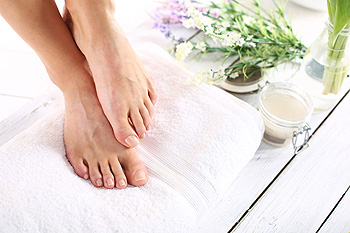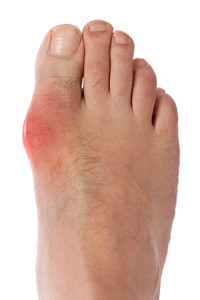Items filtered by date: September 2018
Symptoms of Diabetic Foot Conditions
 If the body does not produce adequate insulin, a condition that is referred to as diabetes may possibly develop. The feet are often affected if this ailment should occur, and if left untreated it may become a serious matter. A condition that may arise from being diabetic is known as diabetic neuropathy. The symptoms may include a loss of sensation in the feet, which can cause difficulty in feeling any cuts, scrapes or blisters that may have developed. Additionally, peripheral vascular disease may be common among diabetic patients, and this may often be a result of changes that may occur in the blood vessels. If you are diabetic, it’s important to be aware of the changes that may occur in your feet. Please consider scheduling a consultation with a podiatrist so the toenails can be properly trimmed and additional information on how to take care of diabetic feet can be acquired.
If the body does not produce adequate insulin, a condition that is referred to as diabetes may possibly develop. The feet are often affected if this ailment should occur, and if left untreated it may become a serious matter. A condition that may arise from being diabetic is known as diabetic neuropathy. The symptoms may include a loss of sensation in the feet, which can cause difficulty in feeling any cuts, scrapes or blisters that may have developed. Additionally, peripheral vascular disease may be common among diabetic patients, and this may often be a result of changes that may occur in the blood vessels. If you are diabetic, it’s important to be aware of the changes that may occur in your feet. Please consider scheduling a consultation with a podiatrist so the toenails can be properly trimmed and additional information on how to take care of diabetic feet can be acquired.
Diabetic foot care is important in preventing foot ailments such as ulcers. If you are suffering from diabetes or have any other concerns about your feet, contact one of our podiatrists from Sayville Foot Care. Our doctors can provide the care you need to keep you pain-free and on your feet.
Diabetic Foot Care
Diabetes affects millions of people every year. The condition can damage blood vessels in many parts of the body, especially the feet. Because of this, taking care of your feet is essential if you have diabetes, and having a podiatrist help monitor your foot health is highly recommended.
The Importance of Caring for Your Feet
- Routinely inspect your feet for bruises or sores.
- Wear socks that fit your feet comfortably.
- Wear comfortable shoes that provide adequate support.
Patients with diabetes should have their doctor monitor their blood levels, as blood sugar levels play such a huge role in diabetic care. Monitoring these levels on a regular basis is highly advised.
It is always best to inform your healthcare professional of any concerns you may have regarding your feet, especially for diabetic patients. Early treatment and routine foot examinations are keys to maintaining proper health, especially because severe complications can arise if proper treatment is not applied.
If you have any questions please feel free to contact our office located in Sayville, NY . We offer the newest diagnostic and treatment technologies for all your foot and ankle needs.
Causes and Symptoms of Gout
 The medical condition referred to as gout is often the result of excess uric acid in the blood levels. Crystals will typically form and lodge in the joints of the big toe, and may cause severe pain and discomfort. There are several symptoms associated with this condition, and these may include swelling, redness and tenderness at the base of the big toe. The crystals generally cause inflammation and there may be extreme pain that is associated with this. Gout attacks may be the result of an inherited trait, or may occur from the foods that are ingested. Specifically, these foods may include an overindulgence of red meat, alcohol, or shellfish, and these may affect the uric acid in the blood. If you are suffering from this condition, please consult with a podiatrist as quickly as possible for correct treatment remedies.
The medical condition referred to as gout is often the result of excess uric acid in the blood levels. Crystals will typically form and lodge in the joints of the big toe, and may cause severe pain and discomfort. There are several symptoms associated with this condition, and these may include swelling, redness and tenderness at the base of the big toe. The crystals generally cause inflammation and there may be extreme pain that is associated with this. Gout attacks may be the result of an inherited trait, or may occur from the foods that are ingested. Specifically, these foods may include an overindulgence of red meat, alcohol, or shellfish, and these may affect the uric acid in the blood. If you are suffering from this condition, please consult with a podiatrist as quickly as possible for correct treatment remedies.
Gout is a painful condition that can be treated. If you are seeking treatment, contact one of our podiatrists from Sayville Foot Care. Our doctors will treat your foot and ankle needs.
What Is Gout?
Gout is a form of arthritis that is characterized by sudden, severe attacks of pain, redness, and tenderness in the joints. The condition usually affects the joint at the base of the big toe. A gout attack can occur at any random time, such as the middle of the night while you are asleep.
Symptoms
- Intense Joint Pain - Usually around the large joint of your big toe, and it most severe within the first four to twelve hours
- Lingering Discomfort - Joint discomfort may last from a few days to a few weeks
- Inflammation and Redness -Affected joints may become swollen, tender, warm and red
- Limited Range of Motion - May experience a decrease in joint mobility
Risk Factors
- Genetics - If family members have gout, you’re more likely to have it
- Medications - Diuretic medications can raise uric acid levels
- Gender/Age - Gout is more common in men until the age of 60. It is believed that estrogen protects women until that point
- Diet - Eating red meat and shellfish increases your risk
- Alcohol - Having more than two alcoholic drinks per day increases your risk
- Obesity - Obese people are at a higher risk for gout
Prior to visiting your podiatrist to receive treatment for gout, there are a few things you should do beforehand. If you have gout you should write down your symptoms--including when they started and how often you experience them, important medical information you may have, and any questions you may have. Writing down these three things will help your podiatrist in assessing your specific situation so that he or she may provide the best route of treatment for you.
If you have any questions, please feel free to contact our office located in Sayville, NY . We offer the newest diagnostic and treatment technologies for all your foot care needs.
Can Plantar Fasciitis be Linked to Obesity?
 Research has shown there is a connection between increased foot pain and an elevated body weight. The foot condition known as plantar fasciitis may be one of the ailments that may occur as a possible result of additional weight the feet must endure. The pain may ease mildly when gentle exercise is performed, however many patients may be unable to take advantage of this because the weight may prevent them from exercising correctly. There have been studies that have been performed that may suggest a link between obesity and additional foot conditions including bunions, flat feet, or tendonitis. Many people may develop these and other foot conditions despite the fact that a conclusion was not able to be reached. If you would like additional information about how obesity can affect your feet, it’s suggested to consult with a podiatrist.
Research has shown there is a connection between increased foot pain and an elevated body weight. The foot condition known as plantar fasciitis may be one of the ailments that may occur as a possible result of additional weight the feet must endure. The pain may ease mildly when gentle exercise is performed, however many patients may be unable to take advantage of this because the weight may prevent them from exercising correctly. There have been studies that have been performed that may suggest a link between obesity and additional foot conditions including bunions, flat feet, or tendonitis. Many people may develop these and other foot conditions despite the fact that a conclusion was not able to be reached. If you would like additional information about how obesity can affect your feet, it’s suggested to consult with a podiatrist.
Obesity has become very problematic at this point in time and can have extremely negative effects on the feet. If you’re an obese individual and are concerned about your feet, contact one of our podiatrists from Sayville Foot Care. Our doctors can provide the care you need to keep you pain-free and on your feet.
Obesity and Your Feet
Since your feet are what support your entire weight when standing, any additional weight can result in pain and swelling. Being overweight is one of the main contributors to foot complications.
Problems & Complications
Extra Weight – Even putting on just a few extra pounds could create serious complications for your feet. As your weight increases, your balance and body will shift, creating new stresses on your feet. This uneven weight distribution can cause pain, even while doing the simplest tasks, such as walking.
Diabetes – People who are overweight are at serious risk of developing type-2 diabetes, which has a drastic impact on the health of your feet. As you get older, your diabetes might worsen, which could lead to loss of feeling in your feet, sores, and bruises. You could also become more prone to various infections.
Plantar fasciitis – Pressure and stress that is placed on muscles, joints, and tendons can trigger plantar fasciitis, which is an inflammation of tissue that forms along the bottom of the foot.
If you have any questions please feel free to contact our office located in Sayville, NY . We offer the newest diagnostic and treatment technologies for all your foot and ankle needs.
How Elderly People Can Check Their Feet
 Many people who are elderly may develop uncomfortable foot conditions as they age. Research has shown there may be many reasons for this to occur. This may include a loss of cushioning in the skin and the nails losing moisture, which may become brittle. If you are contending with poor circulation, any sores that may be present may prove difficult to heal. People of all ages should check their feet regularly to look for cuts, blisters, or ingrown toenails. This is especially true of the older population who may experience difficulty in seeing clearly or bending down. Some patients find it helpful to use a mirror to see the bottom of their feet, or may ask a family member or friend for assistance. It’s important to have your feet measured frequently to ensure the correct size shoe is worn, in addition to wearing socks that fit snugly but are not too tight. If you find conditions such as ingrown toenails, bunions, or corns have developed, it’s suggested to speak with a podiatrist as quickly as possible for correct treatment.
Many people who are elderly may develop uncomfortable foot conditions as they age. Research has shown there may be many reasons for this to occur. This may include a loss of cushioning in the skin and the nails losing moisture, which may become brittle. If you are contending with poor circulation, any sores that may be present may prove difficult to heal. People of all ages should check their feet regularly to look for cuts, blisters, or ingrown toenails. This is especially true of the older population who may experience difficulty in seeing clearly or bending down. Some patients find it helpful to use a mirror to see the bottom of their feet, or may ask a family member or friend for assistance. It’s important to have your feet measured frequently to ensure the correct size shoe is worn, in addition to wearing socks that fit snugly but are not too tight. If you find conditions such as ingrown toenails, bunions, or corns have developed, it’s suggested to speak with a podiatrist as quickly as possible for correct treatment.
Proper foot care is something many older adults forget to consider. If you have any concerns about your feet and ankles, contact one of our podiatrists from Sayville Foot Care. Our doctors can provide the care you need to keep you pain-free and on your feet.
The Elderly and Their Feet
As we age we start to notice many changes in our body, but the elder population may not notice them right away. Medical conditions may prevent the elderly to take notice of their foot health right away. Poor vision is a lead contributor to not taking action for the elderly.
Common Conditions
- Neuropathy – can reduce feeling in the feet and can hide many life-threatening medical conditions.
- Reduced flexibility – prevents the ability of proper toenail trimming, and foot cleaning. If left untreated, it may lead to further medical issues.
- Foot sores – amongst the older population can be serious before they are discovered. Some of the problematic conditions they may face are:
- Gouging toenails affecting nearby toe
- Shoes that don’t fit properly
- Pressure sores
- Loss of circulation in legs & feet
- Edema & swelling of feet and ankles
Susceptible Infections
Diabetes and poor circulation can cause general loss of sensitivity over the years, turning a simple cut into a serious issue.
If you have any questions please feel free to contact our office located in Sayville, NY . We offer the newest diagnostic and treatment technologies for all your foot and ankle needs.
